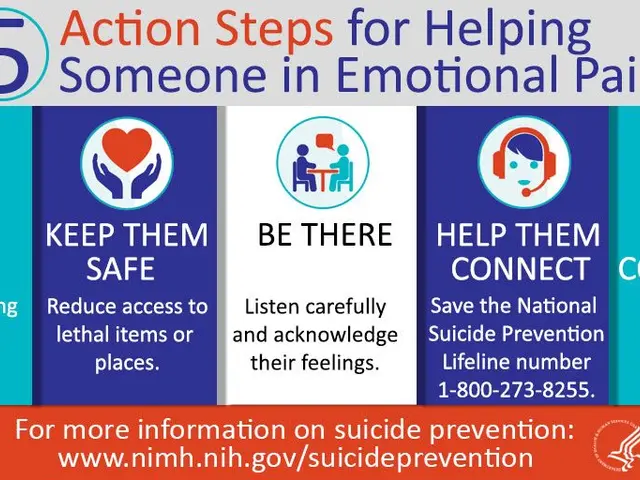Struggling with the Burden of Elderly Parent Care? Discover Strategies to Manage Stress and Find Balance
Feeling stuck in the role of caring for elderly parents is a common experience, filled with emotional, physical, and psychological challenges. Let's break down the reasons why you may feel trapped, so we can help you break free.
Trapped by Emotions
Emotions play a significant role in feeling trapped while caregiving. Here's a closer look at the main feelings causing this sensation:
Guilt and Responsibility
Many primary caregivers struggle under the weight of intense guilt, fearing they're not doing enough for their aging parents. This overwhelming sense of responsibility can make you feel trapped as you may feel pressured to put your own needs on the back burner to meet your parents' expectations.
Grief and Role Reversal
Role reversal can be tough to handle. As your parents grow older, the shift in roles from being cared for to becoming the caregiver can lead to feelings of grief and loss. This emotional toll intensifies as you confront the reality of your parents' declining health and independence.
Isolation and Loneliness
Caring for your parents can sap your social life, leaving you feeling lonely and disconnected. This isolation can escalate feelings of being stuck, making you feel cut off from the rest of the world.
Lack of Support
Inadequate support can make things feel unmanageable. If you don't have a network of family, friends, or professionals to share the caregiving responsibilities, the burden can feel insurmountable.
Exhaustion
The physical demands of caregiving – tasks like assisting with mobility, administering medications, and managing daily routines – can lead to chronic fatigue and caregiver stress. This tiredness combined with the mental stress of constantly worrying about your parents' well-being creates an overwhelming feeling of being trapped.
Financial Strain
Taking care of elderly parents can put a significant financial squeeze on your budget. The costs associated with healthcare, medications, and other necessities can be overwhelming, leaving you feeling trapped due to the economic pressures.
Moving Beyond the Stuck Point
Despite these challenges, it's important not to let feelings of being trapped consume you. Instead, take actionable steps to alleviate the pressure you're under, regain control, and provide the best possible care for your loved ones.
Seek Emotional Support
Don't underestimate the power of support from family and friends. Reach out to your loved ones for emotional support or even to help split caregiving tasks. Taking breaks when needed can help lighten the load and make things feel less overwhelming.
Scheduled Respite Care
Respite care provides professional relief for primary caregivers, allowing you to take a break, knowing that your parents are being well taken care of. These breaks can help prevent burnout and recharge your batteries.
Setting Boundaries and Managing Expectations
Setting clear boundaries and managing expectations with your family is essential to maintain your well-being. Remember it's okay to say no to certain requests or to delegate tasks to others to ensure you don't feel overwhelmed.
Take Care of Yourself
Your health matters just as much as your parents'. Focus on eating well, getting enough sleep, and finding time for exercise to help reduce stress levels. Practicing self-care helps improve your ability to care for others, preventing caregiver burnout.
Therapy and Support Groups
Consider talking to a therapist or joining a support group to help manage the emotional toll of caregiving. A supportive community can offer valuable advice and a sense of connection when you're feeling isolated.
Financial Planning
Taking control of your parents' finances isn't always easy, but it's essential to understand their current financial state, review insurance policies and benefits, and seek out a financial advisor specialized in elder care. Effective financial planning can help alleviate financial stress.
Exploring Care Options
If things become too much to handle, it might be time to consider long-term care options such as assisted living or nursing homes. Evaluating these options and discussing them with your family can help ensure your parents receive the care they need while relieving you of some caregiving responsibilities.
Embracing a Balanced Life
Feeling trapped is a common experience, but it doesn't have to define your journey as a caregiver. By implementing these strategies, you can find balance, regain control, and provide the best possible care for your loved ones while taking care of yourself too.
- Mental health issues, such as depression and anxiety, can arise due to the emotional and psychological challenges faced by caregivers of elderly parents, with guilt and responsibility, grief and role reversal, isolation and loneliness, and exhaustion being key factors.
- Embracing online therapy or seeking support from health-and-wellness professionals can help caregivers cope with the emotional toll of their role, providing a safe space to discuss and manage feelings of stress, grief, and guilt.
- Aging, along with changes in family dynamics and relationships, can complicate the caregiving experience, as caregivers may find it challenging to adapt to new roles and responsibilities.
- Caregivers often experience a financial strain due to increased expenses associated with caring for aging parents, making it essential to engage in science-based financial planning and explore various care options to alleviate economic pressures.
- To maintain a balanced lifestyle and ensure optimal mental health, caregivers must prioritize self-care, setting boundaries, taking breaks, and seeking emotional support from family, friends, support groups, and professionals specialized in elder care and caregiving.








